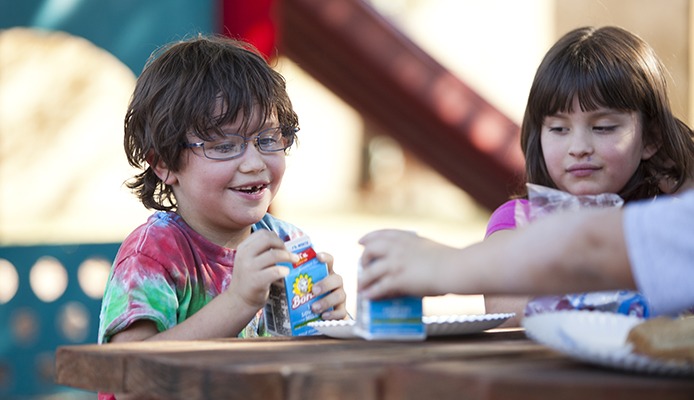Feeding Maryland Children: Congress Debating Child Nutrition

Lawmakers are working on the Child Nutrition Reauthorization Act to continue funding for programs that put food in the stomachs of children across the nation. More than 258,000 Maryland children are food insecure and government-funded programs help put food to the table for them.
Over the last decade, Beahta Davis has come to recognize how meaningful providing hot meals to children through an evening meal program really is.
“Without it, you would have children who wouldn’t get any dinner,” she said.
Davis, who works as the Baltimore County chief of recreation services, and her staff feed local children through the Maryland Food Bank’s Supper Club program at many of the Police Athletic League Centers in the city.
“I met with a mom who said at one point, the only meals her children were eating were at school or at the PAL Center,” Davis said.
But what people may not realize is that these meals, and other child meal programs administered by the Maryland Food Bank, are in jeopardy as lawmakers continue to debate Child Nutrition Reauthorization this year.
Without government funding, program leaders in community centers will be faced with tough decisions when it comes to their programming budgets.
“They have to get something to eat after school,” Davis said. “Without funding, we would have to try and go back to providing snacks for the kids. But we would have to buy those snacks with money that we use for educational and socially important programs.”
The last piece of legislation, The Healthy, Hunger Free Kids Act, was passed in 2010 and lawmakers have vowed to address the reauthorization as a priority this year. Maryland representatives are on-board with pushing this legislation to the forefront.
Sen. Barbara Mikulski, for instance, believes no family should ever have to make decisions between food and housing.
“As a former social worker in Baltimore, I know how important nutrition assistance is for children, keeping them healthy and helping them succeed in school,” she said in a statement. “We must continue to stand on the side of vulnerable families and fight to end hunger in communities across Maryland and America.”
Sen. Ben Cardin also chimed in with his belief that every child should have the opportunity to grow up healthy and strong.
“Ending hunger and poverty will not happen tomorrow, but if we continue to harness the power of the private sector and the NGO community, and use our federal resources in the most effective and transparent way possible, we will have much better outcomes,” he said in a statement. “Proper nutrition is not just important to individual health, it is critical to the long-term health and success of our nation. We must be relentless in striving to assure that no one goes hungry, especially our children.”
Davis just wants to ensure all children who visit PAL Centers have enough access to food to be vibrant and successful. One of the missions of the PAL centers is to provide safe and positive atmospheres in the community for children to develop and grow. And although the meals are adding to the health of the children, they’re making a big difference in the lives of parents too.
“It means we are able to supplement meals and help parents that are really struggling – parents who are not able to provide everything,” she said. “And to be able to take that stress off of them while they’re trying to improve themselves means so much.”
Make your voice heard: visit our Hunger Action Center to become an advocate by taking a pledge or writing to your lawmakers.
*UPDATE* On Jan. 20, the U.S. Senate Committee on Agriculture, Nutrition and Forestry approved the proposed Improving Child Nutrition Integrity and Access Act of 2016.
Get updates on our progress in the fight against hunger
Want to see how your involvement directly impacts the well-being of your neighbors in need? Get the latest news sent to your inbox.







Please help us to feed the children of Baltimore City. After 15 years of serving families in public housing, there is a need for children, within these families, to receive nutritious meals. Though some families are working families, others receive public assistance and their food supply does not last the entire month. I am urging you to reauthorize the programs that feed children.
Thank you
Dr. Taylor
Dr. Taylor, Thanks for being a voice for these children! If you wanted to send this message directly to one of your congresspeople, you can do so with a few clicks here. We appreciate the support!
This email will be forward out to #3000 cont. Bishop, Cephas Richardson, CFP Exc. Dir. Food for the Poor of MD, Inc. 410-258-1543 ceprichbaltimore@yahoo.com
Thanks for the support, sir. With the most recent passage in Senate, we’re getting closer to a win every day!